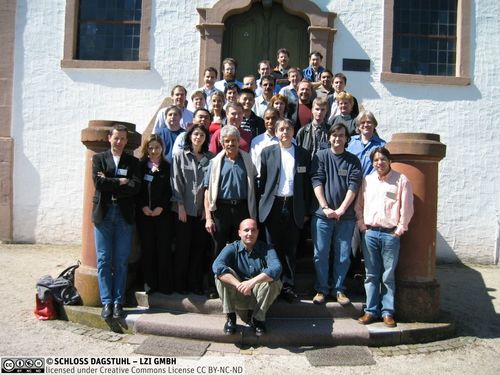Dagstuhl Perspectives Workshop 05152
Peer-to-Peer Mobile Ad Hoc Networks – New Research Issues
( Apr 09 – Apr 12, 2005 )
Permalink
Organizers
- Mario Gerla (UCLA, US)
- Christoph Lindemann (Universität Leipzig, DE)
- Ant Rowstron (Microsoft Research UK - Cambridge, GB)
Contact
Date : Sunday, April 10, 2005, 10:00 am to Tuesday, April 12, 2005, noon
Arrival : April 9, noon or later
Departure : April 12, after lunch (people may stay the night to Wednesday, April 13, if they wish)
A mobile ad hoc network (MANET) is a collection of mobile wireless nodes that can dynamically form a network without any pre-existing infrastructure. Due to the distributed nature of MANET, its networked applications typically employ the peer-to-peer (P2P) paradigm. Multiple P2P networks, corresponding to different applications, may coexist on a large ad hoc network structure (eg, battlefield, urban vehicular grid, etc). MANETs may be standalone, or may grow as an "opportunistic" extension of the wired Internet. In contrast with the wired Internet counterparts, P2P applications for MANETs are still in its infancy. Beyond popular P2P systems like KaZaA, one of the most promising recent developments for the Internet is a set of proposals for P2P look-up services based on Dynamic Hash Tables. In this invited workshop, we would like to focus on the applicability of the wired P2P models to the wireless scenarios and more generally to the challenging research problems emerging in the ad hoc P2P area. Particular topics of this workshop include, but are not limited to:
- Quantitative characterization of mobile P2P application scenarios (e.g., emergency, infotainment, military, ...)
- Design challenges of purely mobile P2P applications (e.g., mobile file sharing, mobile instant messaging, mobile gaming, ...)
- Design challenges for ad hoc networked extensions of wired P2P systems (e.g., Gnutella, KaZaA, dynamic hash tables, multi-player-gaming, ...)
Participation in the workshop is by invitation only. Attendance is limited to 30 people to foster extensive discussion. The workshop will comprise of both plenary sessions and working-in-group sessions. Thus, we are taking the term "workshop" literally and concentrate on discussing existing results and future research challenges rather than just presenting research papers. The goal of the workshop lies in taking stock of the challenges imposed by, and state-of-the-art results, already available for P2P applications for MANET. The workshop will start with a plenary session in which all participants will provide a short introduction to their work. Following the plenary, we will form working groups of 4-8 participants for each of about 4 sub-areas. An area captain will head each working group and will report the results of working-in-group sessions in subsequent plenary sessions. Throughout the workshop, we will focus on several key issues including, but not limited to the following:
- Which results known for wired P2P systems can be adopted for developing and deploying P2P applications for ad networked systems?
- What kinds of new results are needed for developing and deploying P2P applications for ad networked systems?
- What are first success stories and failures of P2P applications?
- What are current burning questions of P2P applications?
After the workshop, the organizers will put together a write up summarizing the discussion results of the workshop (i.e., write a manifesto on the topic) and try to publish this paper in a broadly distributed technical journal. The aim of this paper lies in taking stock of the state-of-the-art in peer-to-peer applications for ad hoc networked systems and in developing recommendations for future research directions in Germany, Europe, and the US. Furthermore, the organizers will apply for guest-editing a special issue on the workshop topic at a journal like Mobile Networking and Applications (ACM MONET). Contributions for this specials issue will be solicited from the workshop participants, though, there is also an open call-for-papers. All submissions will go through a rigorous review process to ensure technical quality.
The organizers applied at the National Science Foundation (NSF) to provide travel support for US participants. Microsoft Research UK has committed to provide travel support for European participants outside Germany. The German Science Foundation (DFG) will provide travel funds for German participants in the scope of the Round Table Program ( "DFG-Rundgespräche").
- Ian F. Akyildiz (Georgia Institute of Technology, US)
- Victor Bahl (Microsoft Research - Redmond, US) [dblp]
- Suman Banerjee (University of Wisconsin - Madison, US) [dblp]
- Christian Bettstetter (DOCOMO Euro-Labs - München, DE)
- Ernst Biersack (EURECOM - Biot, FR) [dblp]
- Klemens Böhm (KIT - Karlsruher Institut für Technologie, DE)
- Miguel Castro (Microsoft Research UK - Cambridge, GB) [dblp]
- Peter Druschel (MPI-SWS - Saarbrücken, DE) [dblp]
- Joseph B. Evans (NSF - Arlington, US)
- Kevin R. Fall (Intel Berkeley Labs, US) [dblp]
- Alain Gefflaut (European Microsoft Innovation Center - Aachen, DE)
- Mario Gerla (UCLA, US) [dblp]
- Andreas Haeberlen (MPI für Informatik - Saarbrücken, DE) [dblp]
- Anthony D. Joseph (University of California - Berkeley, US) [dblp]
- Wolfgang Kellerer (DOCOMO Euro-Labs - München, DE) [dblp]
- Anne-Marie Kermarrec (CAPS entreprise - Rennes, FR) [dblp]
- Christoph Lindemann (Universität Leipzig, DE)
- Eng-Keong Lua (University of Cambridge, GB)
- Petri Mähönen (RWTH Aachen, DE) [dblp]
- Michela Meo (Polytechnic University of Torino, IT)
- Maria G. Papadopouli (University of North Carolina at Chapel Hill, US) [dblp]
- Mike Parker (UCLA, US)
- Giovanni Pau (UCLA, US) [dblp]
- Marcelo Pias (University of Cambridge, GB)
- Ansley Post (MPI-SWS - Saarbrücken, DE)
- Milena Radenkovic (University of Nottingham, GB)
- Janne Riihijärvi (RWTH Aachen, DE)
- Ant Rowstron (Microsoft Research UK - Cambridge, GB) [dblp]
- Wolfgang Schröder-Preikschat (Universität Erlangen-Nürnberg, DE) [dblp]
- Gerit Sonntag (DFG - Bonn, DE) [dblp]
- Ralf Steinmetz (TU Darmstadt, DE) [dblp]
- Maarten van Steen (VU University Amsterdam, NL) [dblp]
- Oliver Waldhorst (KIT - Karlsruher Institut für Technologie, DE) [dblp]
- Ben Zhao (University of California - Santa Barbara, US) [dblp]
- Martina Zitterbart (KIT - Karlsruher Institut für Technologie, DE) [dblp]


